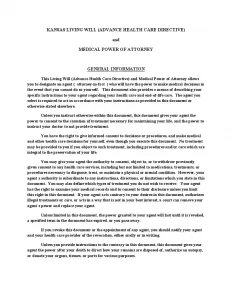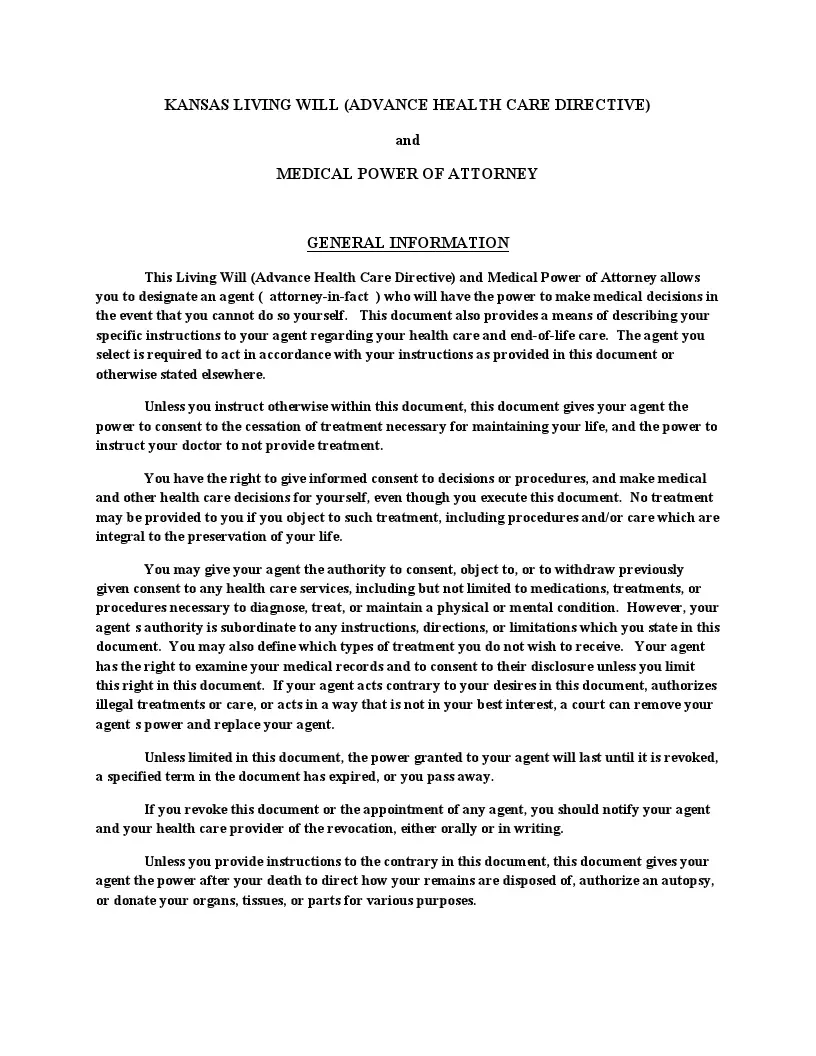Free Kansas Living Will Form
In Kansas, a living will is a legally recognized document that outlines an individual’s preferences for medical treatment in situations where they are unable to communicate their decisions. The Kansas living will should clearly state the declarant’s wishes regarding the withholding or withdrawal of life-sustaining procedures if the declarant is diagnosed with a terminal illness or is in a persistent vegetative state. In Kansas, it is advisable to use a standardized living will form to ensure all necessary details are included.
Signing Requirements and Laws
In Kansas, the creation and execution of a living will, also known as a declaration, are governed by specific statutes to ensure its legal validity. The relevant section of the Kansas Statutes is K.S.A. 65-28,103. This statute outlines the requirements and legal framework for signing a living will.
When creating and signing the living will, the declarant must be at least 18 years old and of sound mind. This ensures that the declarant is legally capable of making informed decisions about their medical treatment. The declarant must sign the living will to indicate they willingly and knowingly express all wishes regarding life-sustaining procedures.
Two individuals must witness the declarant’s signature. The witnesses must meet the following criteria:
- Age. Each witness must be at least 18 years old.
- Independence. Witnesses should not be related to the declarant by blood, marriage, or adoption. They should also not be entitled to any portion of the declarant’s estate under any will or codicil of the declarant or as an heir by law.
- No financial interest. Witnesses must not be directly interested in the declarant’s estate or be financially responsible for the declarant’s medical care.
To avoid potential disputes about the document’s validity, adding an extra layer of authenticity with notarization is recommended.
According to K.S.A. 65-28,104, a declarant can revoke the living will at any time, either in writing or orally. The revocation becomes effective once it is communicated to the attending physician or another healthcare provider. The declarant informs their healthcare provider, family members, and any appointed healthcare agent about the existence and location of the living will to ensure it is readily accessible when needed.
Kansas Living Will Form Details
| Document Name | Kansas Living Will Form |
| State Form Name | Kansas Declaration |
| Signing Requirements | Two Witnesses |
| Validity Requirements | K.S.A. 65-28,103 |
| Powers Limitation | K.S.A. 65-28,107 |
| State Laws: Kansas Statutes, Sections 65-28,101 to 65-28,109 | |

Steps to Fill Out the Form
Filling out the Kansas living will is a crucial step to ensure that your medical preferences are respected if you become unable to communicate them yourself. Follow these steps to complete the Kansas Declaration form accurately.
1. Provide Personal Information
Start by filling in the date, full name, and address in the designated spaces. This step identifies you as the person making the living will.
2. State Your Wishes for End-of-Life Care
Indicate your preferences regarding life-sustaining procedures. The form specifies that if you have a terminal condition certified by two physicians and life-sustaining procedures would only prolong the dying process, you wish for such procedures to be withheld or withdrawn. Confirm your understanding and agreement by checking the appropriate box.
3. Additional Instructions
Decide whether you want to include additional instructions. If you have specific instructions beyond the standard form, check the box indicating that your additional instructions are listed in the form. Check the corresponding box if you do not wish to include additional instructions.
4. Signature of Declarant
Sign and date the form in the designated space. If you are unable to sign, another person may sign on your behalf in your presence and at your direction.
5. Witnesses or Notarization
Choose between having two witnesses or a notary public acknowledge your signature. If you opt for witnesses, they must not be related to you by blood or marriage, not entitled to any portion of your estate, and not financially responsible for your medical care. Each witness must sign and provide their address. Alternatively, if you choose notarization, a notary public will need to acknowledge your signature, and you must provide the county and the date of acknowledgment.
6. Optional Additional Instructions
If you have additional wishes regarding your medical treatment in specific circumstances, outline them in the provided section. Specify any treatments you want to be administered or withheld, such as surgery, dialysis, CPR, antibiotics, mechanical ventilation, tube feeding, and other interventions.
7. Meaningful Quality of Life
Describe what you consider a meaningful quality of life. This information will guide your caregivers and surrogate decision-makers in determining your medical treatment preferences.
7. Final Signature
Sign the form again to confirm your additional instructions. Witnesses or a notary public must acknowledge this signature as well.

Below are various other Kansas templates completed by our users. Try our simple builder to customize these forms to your preferences.
Other Living Will Forms by State
